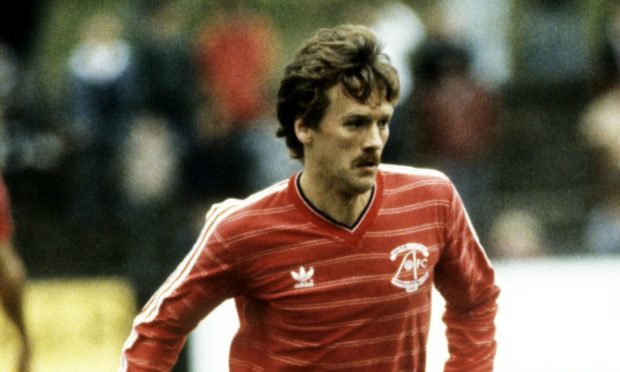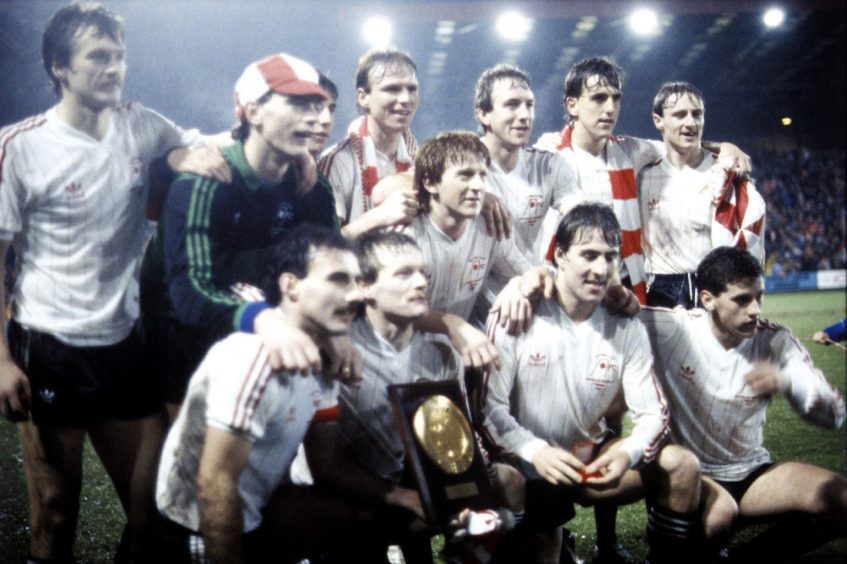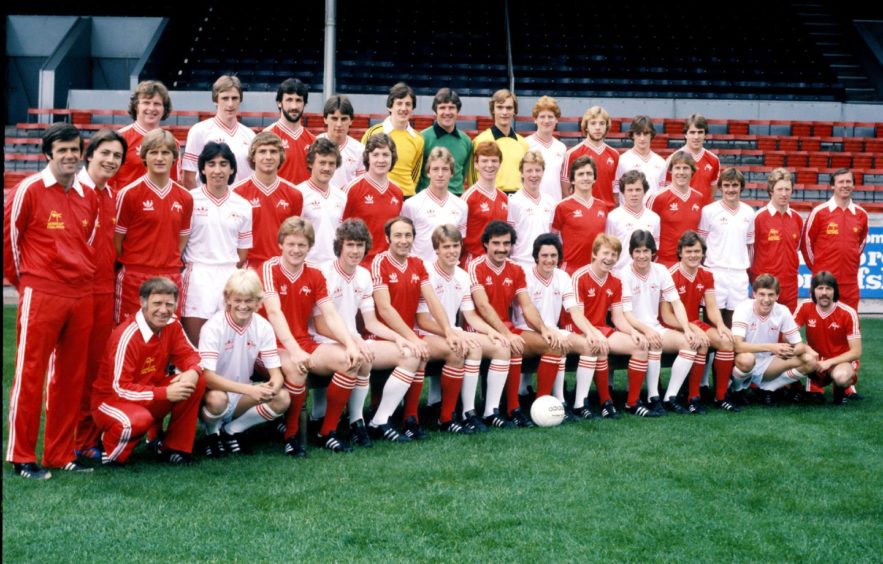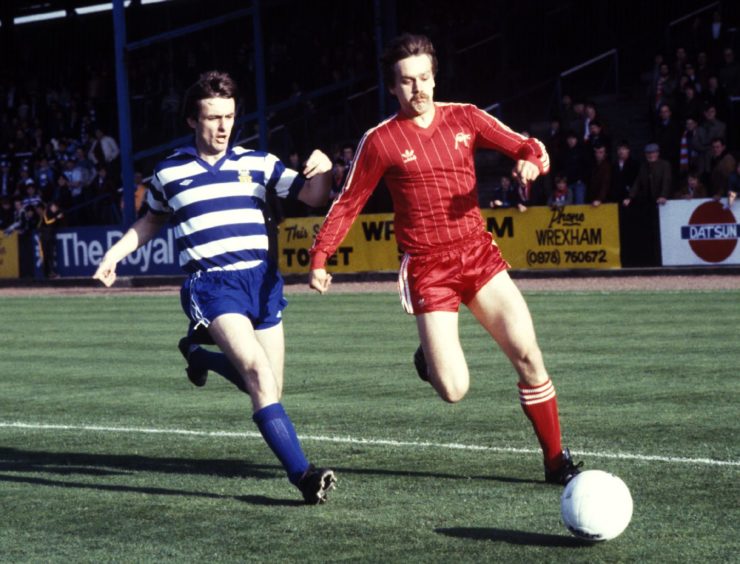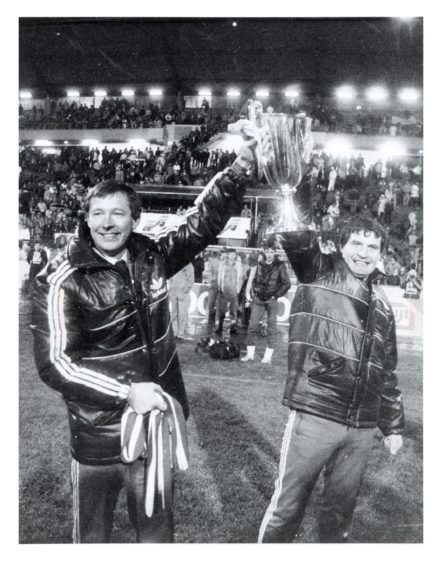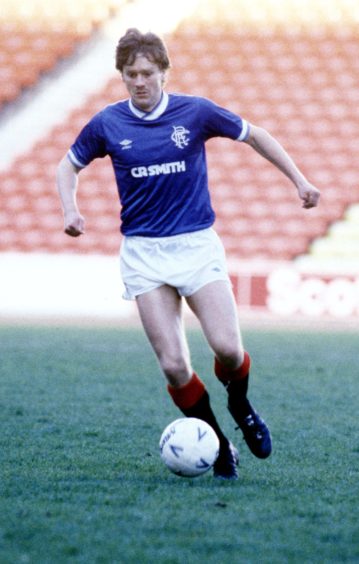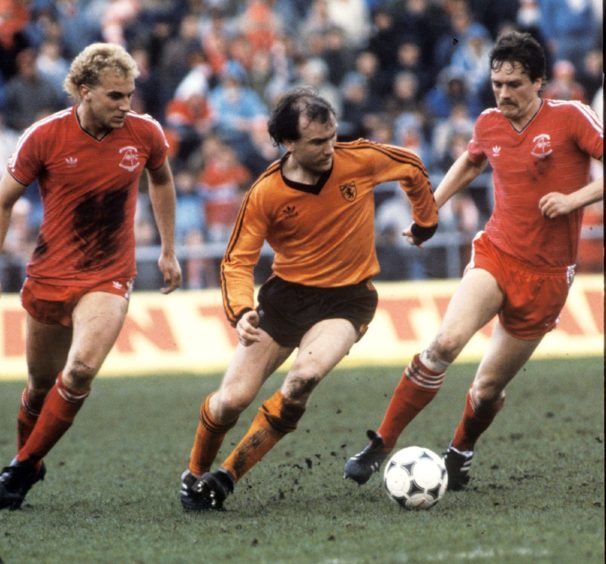He has more clubs than Las Vegas on his CV and his career featured all manner of stratospheric triumphs and Stygian depths.
So we probably shouldn’t be surprised that Dougie Bell, formerly of Cumbernauld United, St Mirren, Aberdeen, Rangers, Hibs, Shrewsbury Town, Hull City, Cork City – pause for breath – Birmingham City, Partick Thistle, Portadown, Clyde, Alloa Athletic, Albion Rovers and Linlithgow Rose – has produced a new book which is positively dripping with anecdotes from his star-spangled career.
Bell was the youngster who was discarded by St Mirren manager Jim Clunie because he was “too skilful” for the style of football he wanted the Buddies to play.
But he was also one of Alex Ferguson’s favourite characters, not least for his tremendous work ethic and positive attitude to putting his body through the wringer.
And Signed Twice by Fergie, which he has created in collaboration with his friend Archie McLeod, highlights the prizes which Bell secured at Pittodrie: three Scottish Championship titles, two Scottish Cups and the European Super Cup in 1983.
Jock Stein helped Alex Ferguson get the Aberdeen job
There is a clear rapport and rapprochement between these two gritty west of Scotland personalities. Straight from the outset, Ferguson was excited by the youngster who had “an electricity running with the ball and could power past opponents with ease.”
“He had great strength and he just brushed players aside. I was reminded of this when I saw the young Paul Gascoigne.
“I will always remember his early games in an under-18 tournament. Doug was opposite the Celtic legend Roy Aitken and, honestly, he took my breath away. I immediately promoted him to the first-team squad.
“His last game for St Mirren was against Celtic and he scored in a great win. When I left Love Street for Aberdeen, one of my first jobs was to sign Doug – on a free transfer.”
The feeling was mutual. But Bell has explained how Jock Stein was one of the reasons why Ferguson ended up at Pittodrie in the first place.
He said: “Events surrounding Fergie’s departure from St Mirren and his appointment at Aberdeen came together to work perfectly for me.
“Dick Donald [the Dons chairman] phoned Jock to ask about the suitability of Bertie Auld to replace Billy McNeill [who was appointed Celtic boss in 1978]. Stein rated Bertie highly, but Fergie had come on to his radar and he suggested that he might be a better fit and a risk worth taking.
“Mr Donald went with it and thank goodness he did. Fergie always recognised that I was made for a midfield role and, of course, so did I. I joined Aberdeen at the start of the 1979-80 season at a time when no club outside of Rangers and Celtic had won the league since Kilmarnock did so in 1965.
“But, at the end of my first season, I had my first of three league winners’ medals. Aberdeen were crowned the team of the decade in the 1980s with 11 major trophies in ten years and I was immensely proud to play a part in that success.”
Joy and sadness during the Dons’ epic European missions
As an accomplished and classy player on the grandest occasions, it was hardly surprising that Bell rung resonantly during Aberdeen’s most memorable year in 1983, when they finished up with two European trophies in their cabinet.
These were the heady, halcyon days of the Gothenburg Greats, who beat Real Madrid on a glorious night in Gothenburg and although Bell was injured for that contest – which the Scots won 2-1 with the coup de grace from John Hewitt – he excelled in other matches in the competition, as his manager recalled.
Ferguson said: “Doug had a great career with Aberdeen, where some of his performances on the biggest European nights live long in the memory of Dons supporters. When we won the European Cup Winners’ Cup, who could forget his performance against Bayern Munich in the first leg of the quarter-final?
“He played a big part in us winning in Europe”
“His performance in the first leg of the semi-final against Waterschei [which the Dons won 5-1] was sensational and he was my man of the match that night.
“[A broken leg meant] he missed the final in Gothenburg and it was a huge disappointment. But all the players and the staff knew the part that he had played in getting us there.”
Bell talks about his sadness at not being involved in that epic and unprecedented success for the Dons, but he wasn’t to miss out on another stellar accolade.
And, in helping his side beat Hamburg in December 1983, Bell ensured that the north-east team became the only Scottish club to win a brace of European honours.
Bell talks about being involved in Super Cup success
The player was obviously proud of his exploits after his return from injury as he continued to thrive in the spotlight at Pittodrie.
And he relished the emphatic manner in which Aberdeen rose to the challenge to overcome Hamburg 2-0 despite squandering an abundance of chances.
He said: “The final was played over two legs and the first one was in Germany. We feared nobody and I saw these games, in part, as consolation for me missing the Cup Winners’ Cup final and a medal.
“I was at the top of my game again and I couldn’t wait for it. I remember an unspectacular first leg which ended 0-0. The weather was horrendous with torrential rain and we had to defend well with Willie Miller and Jim Leighton prominent as they so often were throughout these years.
“Every ticket was sold for the second leg at Pittodrie and the situation was made for me with a full house, a huge occasion, and talented and glamorous opposition.
“I remembered the surprise and disappointment of being on the bench for the return leg against Bayern Munich in the previous season’s Cup Winners’ Cup, but I was convinced that I would start in the Super Cup second leg – and I did.
“It was a great consolation and there was a terrific atmosphere at Pittodrie which is something I will never forget.
“We won reasonably comfortably [with goals from Mark McGhee and Neil Simpson], even with us missing loads of chances.
“And we did something that no other Scottish club has ever achieved.”
Bell nearly sparked a riot on his return to Pittodrie
After playing 185 competitive games for Aberdeen, Bell moved on to Rangers, but only after suffering a potentially life-threatening injury during a clash with Hearts goalkeeper Henry Smith in September 1984.
He was still in awe of Ferguson’s “magic formula”, and was touched by a handwritten letter he received from the Dons chairman Chris Anderson which ended with the heartfelt words: “Thank you for the joy your skilful play gave us.”
But he also had a lot of admiration for the Rangers manager, Jock Wallace, even if the Ibrox organisation insisted he remove his Zapata-style moustache.
And Bell was among those who witnessed the revolution which occurred under Graeme Souness at the club, which had been under-achieving for most of the 1980s.
Yet, while he gained another league championship medal at the Glasgow giants, he was also involved in an explosive return to his former haunts.
When Bell travelled to Pittodrie with Rangers, he could never fathom the hostility which was aimed at him by many of the home supporters.
But he admitted he lost the plot and almost found himself in trouble with the police after his actions during one typically rancorous encounter.
He said: “I was angry at the fans who were giving me personal abuse and that anger escalated to rage, so when I was going off, I decided to gesticulate to the baying crowd with v-signs on the way to the tunnel.
“We had six great years together, yet now it seemed they hated me. But me giving the fingers kicked off a near riot and Pittodrie went into meltdown.”
“I was escorted to the away changing room”
Bell added: “The duty police inspector declared he was going to charge me for inciting the crowd and I was escorted to the away changing room and told not to leave it.
“I calmed down a bit in the shower and sought out the inspector to apologise to him. He accepted my apology with no more action on his part and that was a big relief.”
Bell has taken time to “set the record straight” in his new book and refute any suggestion that the v-sign was in any way directed at Alex Ferguson.
But, given the respect which these two tough hombres have always had for one another, there was no need for an apology.
The book is a tribute to Dougie’s late wife Hazel
Dougie Bell has dedicated Signed Twice by Fergie to the memory of his late wife Hazel Smart and is determined to help cancer-related charities.
He explained: “We had this book nearly ready for publishing when my wife of 37 years, Hazel, was diagnosed with cancer and died within a few months.
“People close to me knew how much Hazel meant to me, how much I loved her, how much I relied on her and how she helped and encouraged me in all aspects of my life.
“She was heavily involved in the book, knew what it contained, and contributed directly to it. She wanted Archie and I to finish it and it is dedicated to her.”
The book is available on amazon.co.uk.
